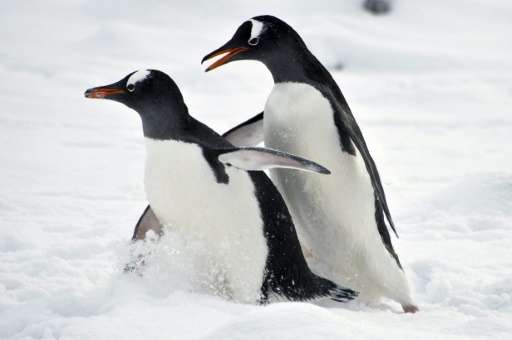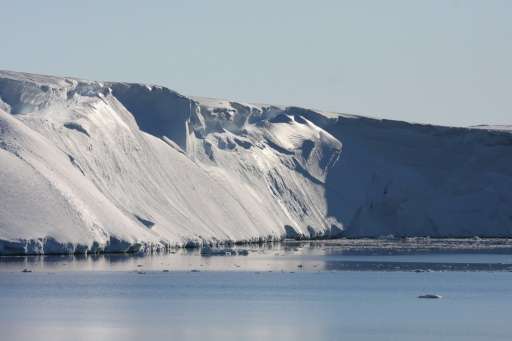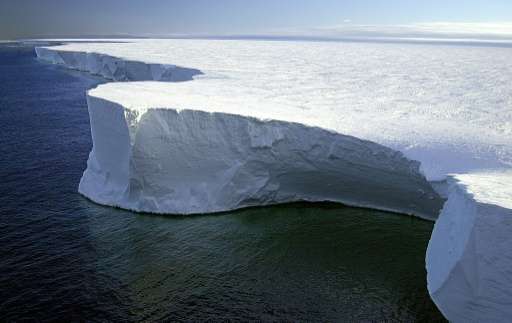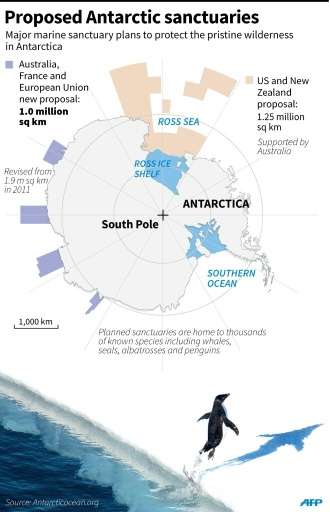Vast Antarctic marine reserves in focus at Australia talks

Campaigners Monday urged global leaders to put aside differences and create two vast Antarctic marine sanctuaries to protect one of the world's last untouched wildernesses and a unique array of species including whales and giant squid.
The fate of the plans to shield critical areas of ocean around the frozen continent is in the hands of the Commission for the Conservation of Antarctic Marine Living Resources (CCAMLR), which opened its annual meeting in Hobart.
CCAMLR is a 25-member body tasked with overseeing conservation and sustainable exploitation of the Antarctic Ocean, also known as the Southern Ocean.
The talks run until October 30, with both an Australian-backed East Antarctic scheme and a US-New Zealand bid for a protected zone in the Ross Sea blocked four times so far due to a lack of consensus among the 24 member countries and the European Union.
"Antarctica is one of the world's last untouched wildernesses and is critical for scientific research, both for studying how intact marine ecosystems function and for monitoring the impacts of climate change," said Maritza Schaefer, Greenpeace International's global campaign leader for oceans.
"Fully protected marine reserves are the single most powerful tool that CCAMLR has for fulfilling its mandate and protecting the astounding array of Antarctica's marine life and enabling the Southern Ocean ecosystem to best withstand the impacts of climate change and ocean acidification."
Environmentalists say the Southern Ocean is home to more than 10,000 unique species, including penguins, whales, seals and colossal squid, as well as being a region critical for scientific research.

Mark Epstein, executive director of the Antarctic and Southern Ocean Coalition, added that "CCAMLR promised that this protection would come by 2012, yet the process has been stalled for the last four meetings".
"Global leaders—many of whom are CCAMLR members—have a responsibility to take action now, ensuring these marine protected areas come into force at this meeting," he said.
Australia, France and the European Union first put forward a bid for a 1.9 million square kilometre (760,000 square mile) Marine Protected Area encompassing seven stretches of the pristine continent in 2011.
But it was again knocked back last year with Russia and China citing geo-political issues and concerns about its size.
Compromises have been made with the current proposal for a 1.0 million square kilometre zone over four areas with some fishing and research allowed as long as conservation values are met.
Set aside differences

The Ross Sea plan has also been scaled down, to 1.25 million square kilometres, with 1.14 million square kilometres proposed as a "no take" zone in an area often referred to as the "Last Ocean" due to its pristine condition.
Both of them must win the support of all 25 members of CCAMLR to succeed.
Australian Antarctic Division director Nick Gales, who is leading Australia's delegation, said ensuring the impacts of climate change were factored in to CCAMLR management decisions would also be a priority issue.

"Australia will be joined by Norway in proposing the establishment of a climate change focused group to provide information, advice and recommendations on how best to integrate climate change considerations into the work of the commission," he said.
Another key area of discussion includes the effective and sustainable management of fishing krill, a cornerstone of the Antarctic eco-system and the staple diet of many animals, including seals, whales, fish, squid, penguins and other seabirds.
"While current harvests are well below the total allowable catch set by CCAMLR, demands on the fishery are expanding as krill is increasingly recognised as a valuable resource in medical products and supplements, and as fish meal," said Gales.
© 2015 AFP





















